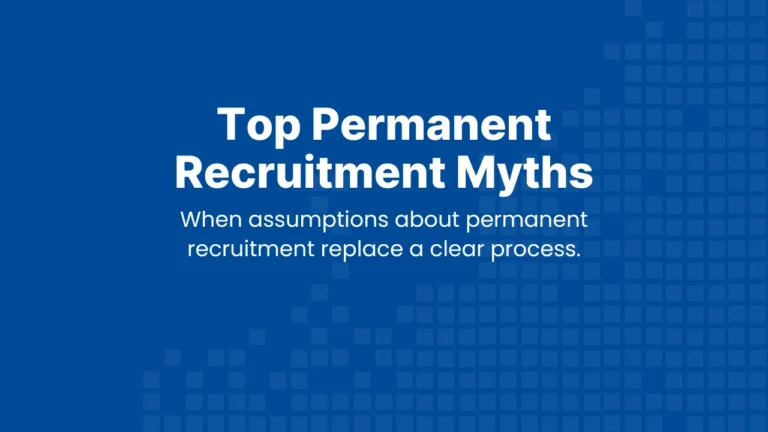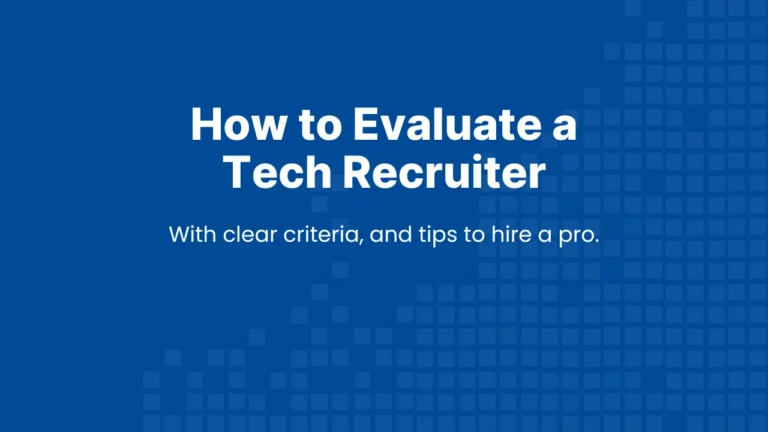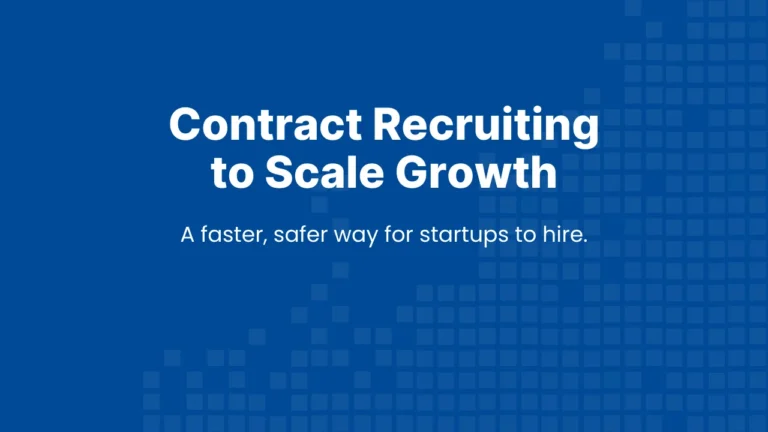“I don’t need perfect,” the founder said, rubbing his temples. “I just need someone who can pick this up and go. Tomorrow, if possible.”
They’d just finished their morning team sync. A critical platform update was slipping, and their one backend contractor had bailed with zero notice. The product manager looked concerned, and the engineer who picked up the slack was already pulling late nights. Everyone was tired, and nobody wanted to start the hiring process from scratch.
This isn’t a dramatic scenario. It’s a Tuesday.
For early-stage teams, the pressure to move quickly often collides with the harsh reality that a bad hire can only exacerbate the situation. A contractor who disappears, a mismatch on expectations, or someone who can’t deliver means missed timelines and team burnout.
Contract recruiting provides startups with a way to move quickly without rushing into poor decisions. And when done properly, it fills a role and helps you build the team you need.
Why Startups Can’t Afford to Hire Slowly
When a key contributor leaves mid-cycle or your roadmap shifts suddenly, you don’t have the luxury of a 6-week search. Hiring delays can lead to product slowdowns, force team leads to carry excessive workloads, and raise questions from investors about execution. Our cost of delayed hiring calculator can show you how quickly a hiring delay can become expensive.
But moving too fast with the wrong partner can backfire. Some firms will spam your inbox with resumes that aren’t relevant, hoping one lands. In fast-moving environments, that kind of hiring slows you down even more.
What you need is a model that provides speed without shortcuts.
Hiring Traps Startups Fall Into
Founders under pressure often make early hiring decisions based on instinct or availability rather than a structured approach. We’ve seen startups:
- Pull in a referral without vetting for role-specific experience
- Skip expectations, leading to mismatched priorities later
- Hire fast, but spend weeks managing performance or realigning scope
These aren’t uncommon. But they are avoidable with the right hiring system in place.
The Risks of Going DIY With Early-Stage Hires
Many founders attempt to handle early hiring themselves to save time or stay lean. Sometimes it works. But when it doesn’t, the cost is higher than expected. We’ve seen DIY hires derail delivery timelines, introduce scope confusion, or exit mid-project. These are operational risks.
STACK IT brings structure to the process. We provide founders with a way to move quickly without skipping the steps that ensure the quality of the hire.
What Most Firms Get Wrong About Contract Recruiting
Contract recruiting is often treated as a low-resource process. Quick in, quick out. No long-term expectations. That’s exactly why it fails in high-stakes startup environments.
The most common mistakes we see:
- Resume volume over role fit
- Minimal vetting before candidates are presented
- No follow-through once a contractor is placed
- Rigid timelines and no room to adapt when the role shifts
Startups don’t need a dozen candidates. They need contributors who can come in quickly, understand the team dynamic, and deliver from day one. That requires more care, which is why understanding contract recruiting fees upfront is crucial for founders who need to strike a balance between speed and budget.
How STACK IT Supports Startups Quickly
STACK IT’s contract recruiting model is structured for early-stage urgency. It moves quickly while maintaining high quality. Every contractor is vetted with the same process we use for permanent hires.
Employer of Record = Admin-Free Hiring
You don’t have time for the legal and administrative responsibilities of a contract hire? We act as the legal employer, handling contracts, payroll, and compliance. That means:
- No back-office complexity
- No contractor admin/setup delays
- No legal challenges to worry about
No-compromise Screening
Contract doesn’t mean “close enough.” Every candidate goes through our standard vetting process:
- Real-world screening prompts
- Technical depth evaluation
- Culture and communication fit
We vet for people who can contribute in the now. These are vetted tech contractors, not blind hires.
Fast Turnaround, With Accountability
Most contract roles are filled in 5–10 business days, making this one of the most practical approaches for fast contract recruiting. If a match isn’t right, we replace it quickly. We don’t disappear after placement.
You can pause, extend, or transition the contract as your roadmap evolves.
Buyout Flexibility That Works for Founders
Sometimes, a contract can become the right long-term fit. STACK IT makes that easy:
- Convert to full-time at any point
- The longer the contractor stays, the lower the buyout
- No inflated penalties or confusing clauses
We designed this to support how startups hire. That’s it, clear and simple.

What to Expect During the First Week of a Contract Engagement
Getting a contractor started quickly isn’t the challenge; getting them productive is.
STACK IT handles onboarding details in advance, so candidates arrive ready.
During the first week, we confirm tool access, review the scope, and remain available in case anything changes. This saves founders from spending their time covering basics and gives teams support right away.
When Contract Recruiting Makes Strategic Sense
We see founders turn to contract recruiting when:
- A high-priority project needs delivery support now
- The team isn’t ready to commit to another full-time employee in the headcount
- They want to evaluate how someone fits before converting them
- They’re unsure what the long-term needs will look like post-project
Examples We’ve Seen
- A Series A SaaS company brought in a DevOps contractor through STACK IT to stabilize delivery while holding off on permanent hiring until their next funding milestone.
- A healthcare client was mid-sprint when a QA lead exited. We placed a contractor in five days, helping them keep delivery on schedule. They converted the hire after launch.
- A founder hiring their first data engineer used contract-to-permanent to test the contractor before building out the team further.
Each of these teams moved fast but did so with structure and accountability. Recent labour research indicates that more than half of Canadian companies plan to increase contract or project-based hiring, a trend that reflects how founders are increasingly relying on flexible solutions.
Contract-to-Hire: A Smarter Path
There’s a perception that contract-to-hire is a fallback move. It isn’t. The best startup teams use it to manage risk, especially when the role isn’t fully defined or the product direction is still evolving.
It creates room to evaluate how someone works with the team before making a longer-term commitment.
Why It Works in Early-Stage Environments
Startups don’t hire from a script. Roles evolve, funding timelines shift, and teams need flexibility. STACK IT works with that reality.
We don’t send resumes and walk away. We:
- Move quickly when something changes
- Stay close to hiring managers after a placement
- Replace contractors fast if the fit is off
- Follow through when conversion conversations come up
Contract recruiting works for startups when the partner behind it acts like part of the team. It’s flexible tech recruiting that adapts as your product, priorities, or funding stage evolves.
Common Questions Founders Ask About Contract Recruiting
How do we keep delivery on track if someone leaves suddenly?
Startups rarely have bench strength. When a key contributor exits, we source and onboard within days to prevent the rest of the team from burning out.
What if our funding round is months away, but we still need talent now?
That’s when contract-to-permanent is most effective. You get immediate delivery capacity, with the option to convert once funding closes without restarting the search.
Can a contractor actually carry ownership in a startup environment?
Yes. We place senior-level contributors who can run a sprint, stabilize infrastructure, or lead a handoff. They integrate fast, but they don’t need micromanaging.
Final Word: Urgency and Fit Can Coexist
That same founder who needed someone “tomorrow”? They reached out to us before lunch. We ran the intake call that afternoon. By the following Monday, the new contractor was already onboarding.
Three weeks later, their software update went live. The team got their evenings back. And the founder was talking with us about making the hire permanent.
That’s what well-run contract recruiting can look like when it meets the pace of your startup.
STACK IT’s contract recruiting model was built for this moment, for founders who need to move but can’t afford to miss the mark. It’s startup hiring support that reflects how early-stage teams truly work.
Let’s talk about the hires you can’t afford to get wrong.




